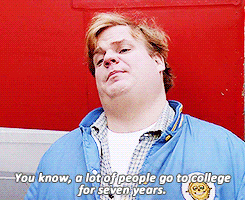How My Incredibly Niche Graduate Thesis Set Me Up For Success As a Copywriter
Remember in the movie Tommy Boy when Chris Farley says, “a lot of people go to college for seven years,” with all the confidence in the world:? And David Spade sharply retorts “I know. They’re called doctors.” (Laughter from the audience)
I actually went to college for nine years and I am not a doctor.
“Oh but a Ph.D.," you ask? “You must have a Doctorate.” Nope.
Here’s what I do have (besides debt): two Bachelor degrees, one Masters, an extensive—and eclectic—skill set and several pieces of thick, fancy paper in cheap frames on my wall. I like to think I technically have three Bachelors since my first foray in higher education ended with a double major. But let’s focus on those skills instead of semantics.
Fake it ‘till you make it
I wasn’t as prepared for graduate school as I thought I was. I ended up at a wonderful New England university, in a lovely History department with lovely people (mostly).
Still, I struggled with finding my place in a crowd that seemed to already know their place. Not only that, but they’d known for years; they knew what they wanted, they had their eyes on the prize, and I envied them all.
But I was determined to put everything I had into whatever was placed before me. Fake it ‘til you make it, right? Honestly, not only did that attitude work for me, it evolved into something bigger.
One of the best skills I walked away with—and probably my favorite—is something I like to call “academic adaptability.”
Academic Adaptability
Now, does this mean I’m simply a jack of all trades yet master of none? No. This means that no matter what was put in front of me, I found a way to excel.
Does that mean I’m just naturally good at whatever I try? A resounding, laughable “no.” Absolutely not.
In fact, for most of my schooling I worked extremely hard only to be incredibly average. Sure, there were flashes of brilliance and originality. I was often “a joy to have in class,” but I wasn’t on the Honor Roll and I was by no means exceptional. Not on paper anyway
But…I became adaptable.
I made sure I always found something to pique my interest, no matter how obscure or niche it was. I made it work. I understood the assignment.
In my copywriting today, I believe in having range, remaining fluid, and open to anything that comes my way whether it's within my niche or not.
How it started:
It’s hard to keep yourself focused academically when there are so many options and you have so many interests. It’s even harder when you’re stuck choosing between what you like versus what you’re good at. And don’t even get me started on the question, “Do I do what I love or do I do what will pay me well someday?”
I won’t go on and on about my thesis—if you’re curious, there are more details on the About page of my website, and if you’re super curious here’s the link to the thesis itself—but it’s important to know that it crossed a lot of genres and fields of study. Majoring in U.S. History, I went to graduate school to pursue my focus on the Civil War, but a lot of logistics made that difficult for me.
Broken expectations and some ugly crying in the bathroom actually led to a really beautiful, unique thesis; a story that covered three generations of war, politics, race, slavery, marriage, intellectual history, architecture, and material history.
If that sounds like too many things that’s because, traditionally, it is. But with the help of a fantastic, supportive, and diverse faculty committee, I pulled it off.
How it’s going:
Now that I’m a copywriter, those skills I accidentally developed and those lessons I painstakingly learned while writing my incredibly niche thesis are truly paying off—student debt, be damned. Here’s how:
It keeps me creative
A lot of grad school felt like falling down and getting dirt kicked in my face; I was often discouraged and depressed. I was forced to adapt and pivot over and over again. It was exhausting.
But this also left me with a strange sense of orphan-like independence. While some of the department higher-ups were worried by my lack of focus, by the end of the year I was nominated for a Creativity Award for my bold arguments and brazen genre-crossing. I didn’t win, but I still achieved way more than some people thought I would. All because I decided to stray from tradition and it actually paid off.
I was once advised to change my specialty because “the Civil War has been done to death anyway.” It’s taken me years to shake that off. But now, I don’t believe that anything can be done to death.
As a copywriter, I’m frequently presented with the dilemma of trying to do what has not already been done before. There’s always something that hasn’t been tried before, hasn’t been considered, or hasn’t even been noticed. You just have to dare to look, not deeper, but differently, creatively. Adapting and pivoting have become second nature.
It may not be easy, but it’s certainly not impossible. Hearing the phrase “I’ve never thought of that before,” invokes a specific kind of joy in the heart of the creative thinker. Ooh, it gives me chills.
Photo by RJ Trazona on Unsplash
It taught me confidence
No matter how abstract your ideas may be they can be transmuted into a declarative statement. Dancing around your point will get you nowhere and today’s readers are in a hurry; don’t be afraid to say exactly what you want to say.
In the same vein, never bury the lead. While I love to write with descriptive, lush language that paints a picture, it’s easy to drown in your own prose by accident. Clear is better than clever, and good copy is all about striking that balance. The journey might be more important than the destination, but it’s important to at least know where you’re going once you’ve started.
Confidence is key. Trust that your reader is along for the ride and give them everything they need to know up front.
It taught me discernment
What’s the number one rule of academic or nonfiction writing? Cite your sources. Copywriters know this. But what did grad school teach me first? Source criticism.
Research is paramount to a copywriter. It’s what helps us produce effective copy over and over again for whatever kind of client we may have; huge companies, small businesses, entrepreneurs—you name it! But research has little value if you aren’t doing it correctly and ethically.
It isn’t enough to declare who wrote it or where you found it. Believe it or not, discernment is a skill many readers today just don’t have, and it’s our job to practice discernment for them.
Who is the source and can they be trusted? Was it published by an established, trusted university press or was it published independently? It’s an unfortunate circumstance where your best course of action is to follow the money—the more obscure the publishing source, the more flimsy the content might be. This is not always the case but it’s best to stay vigilant.
Information is endless these days, but practicing discernment and source criticism keeps my copy current, factual, and conscientious of my audience.
Photo by Maksym Kaharlytskyi on Unsplash
It reminds me that anything is possible
If your niche doesn’t exist, invent it. Because someone out there needs it.
The professor I wanted most to work with only had one semester left before his retirement. I had hoped to bond with him well enough that his impending exit wouldn’t matter; I would impress him with my savvy understanding, charm him with my creativity, pick his brain and absorb his brilliance. Turns out, we did not get along and we quickly had an unspoken yet intense dislike for one another.
There was no obvious professor to serve as my advisor so I had to pull support from wherever I could find it. And it was very hard to find—so hard I wanted to quit.
The professors I eventually bonded with most were validating and nurturing but never stopped challenging me; their support was ceaseless.
My committee felt like an academic Suicide Squad that wanted to prove my worth to the naysayers as badly as I did. They knew my niche didn’t exist so they helped me create it.
When the establishment stops working for you, dismantle it. And start rebuilding.
Radical Optimism—The Secret Skill
I read somewhere once that “Optimism is a muscle that gets stronger with use.”
It’s easy to believe that your voice doesn’t matter, that it’ll just drown in the sea of other, louder, stronger voices. It may feel exhausting, isolating, and thankless. That’s why those optimism muscles need constant exercise.
Someone out there needs to see you being unique and owning it.
That’s when you begin to transcend words like “niche” and start hearing words like “revolutionary,” and phrases like “cutting edge,” or “ahead of their time.”
Become radically optimistic, stay vigilant, and stay creative—you never know who’s watching.





